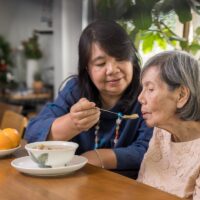Considerations for Caregivers – How to Help Your Loved One and Other Family Members During Difficult Times

In our last post, we discussed the importance of planning for incapacity and end-of-life care, creating a complete set of legal documents so family members caring for an elderly parent or spouse have the ability to ensure their loved one gets adequate care and that they are appropriately looked after, both in terms of their physical and financial well-being. Alongside creating these planning tools are some practical considerations. Below we discuss some of the conversations you should consider having with your elder and other family members as well to enhance both quality of life and domestic harmony during what can be emotionally difficult times for all involved.
For advice and representation customized to the needs of your family in Harris County, contact the Law Office of Maria Lowry to speak with a skilled and compassionate Houston estate planning and elder law attorney.
Communication Is Key
If you think you may become someone’s caregiver, it’s important to have a conversation about what kind of end-of-life care they want. For example, would they want to be maintained with a ventilator and external heart machine if needed, or would they prefer palliative care in a hospital or hospice care at home? What about a do-not-resuscitate order (DNR)? It’s also important to ask about funeral, burial or cremation wishes. Do they have particular cultural sensitives, religious requirements, or family traditions in these areas? Tackling all of these issues in one talk can be overwhelming, so consider arranging a series of conversations. Having ongoing discussions will also build trust and peace of mind. When the time comes to put these decisions into practice, you won’t be able to ask the person directly what they want, so be sure to have these conversations in advance.
Another advance topic to discuss is whether to consolidate assets into one account at some point or leave them in different banks. Also, what was the aging and death process like for their parents? This can give you an idea of what you can expect. What traumas or horrors do they have about death and dying? For example, one elderly woman who as a four-year-old saw her father laid out after his death was always terrified of open caskets and vehemently requires that hers be shut. You won’t know until you ask.
Caregiving Involves Protection and Trust
It is one of the more despicable facts of life that scammers intentionally target the elderly as they are, as a group, more vulnerable and susceptible to fraud, deceit, and undue influence. While the elder is able to move around the world and do things, it might be advisable to ask them to use a prepaid visa card. This financial tool provides independence but also prevents overspending if a “friend” asks them for a television or other scams. A pre-paid card might not deter all scams, but it puts a limit on what can be lost at any one time.
The person who acts as an agent under a power of attorney or a guardian under a guardianship is a fiduciary, meaning they are required to act in the person’s best interest when handling their money and property. Texas law imposes legal requirements on fiduciaries and a heightened duty to do as the person would have wanted, and there are criminal penalties for doing a bad job. Agents and guardians should provide regular reports to the other family members who should be involved, informed, and watch for problems or inconsistencies. If someone is misusing funds or is not taking care of the principal or ward, the appointment needs to be ended.
Respect Family Roles and Feelings
Whether you are a person’s sole caregiver or one of many, remember that when the person you are caring for dies, their death will impact a large number of people in different ways. Recognize that different family members will have their own grief processes and their own coping strategies. No one way is “right” or “wrong,” although the way some people cope may look different than yours. Try to avoid making guesses about how someone feels based on the way they act.
Family dynamics are often complicated, and spouses who marry into the family may be treated just like “one of the family” and may even have helpful experience or expertise in end-of-life matters. Even so, the best practice is for in-laws to share their experiences or express their opinions privately to their spouses, but they should not take part in family meetings or weigh in on decisions regarding issues such as whether a parent needs full-time care and how to pay for it. Of course, every family is different and works in different ways, but a general rule of thumb for spouses is to be supportive without intervening in decision-making.
Contact Lowry Family Law for Help With Estate Planning, Probate, Guardianship, and Other Family Law Matters in Houston and Harris County
Lowry Family Law is here to help you navigate legal areas that are often complex, confusing, or emotionally challenging but are always essential to accomplish effectively. For practical guidance and professional support with estate planning and related matters in Harris County, call the Houston Law Office of Maria Lowry at 713-850-8859.
